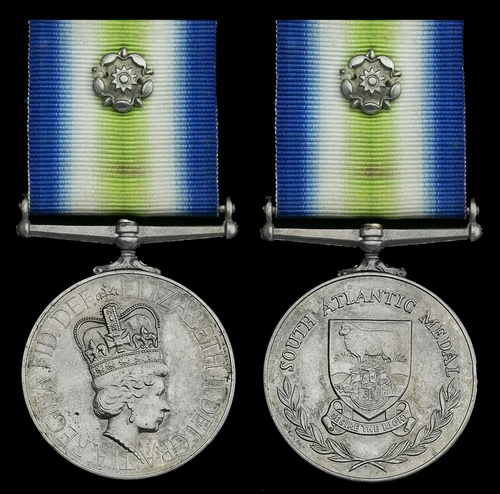
Auction: 18003 - Orders, Decorations and Medals
Lot: 307
(x) South Atlantic 1982, with rosette (21158695 Cpl Parsuram Rai 7GR), mounted as worn, nearly extremely fine
At the outbreak of the Falklands War, the 1st Battalion, 7th (Duke of Edinburgh's Own) Gurkha Rifles were based in the United Kingdom and had been training on the Brecon Beacons. They were deployed with 5th Infantry Brigade and arrived in Fitzroy around 7 June.
Helicoptered into position on 13 June, close to Two Sisters and parallel with the 2nd Battalion, Scots Guards, they moved forward along Goat Ridge under fire, and casualties were taken as they approached the objective, Mount William. The action upon Mount Tumbledown would surely have been visible and as dawn broke a daylight assault was necessary. Scaling William, the Gurkhas found the enemy had withdrawn just as the attack drew in, with the surrender signed that very same day. The 7th Gurkhas had added what would be there last battle honour before the amalgamation to form the Royal Gurkha Rifles in 1994.
A notable postscript is taken up in Imperial Warriors:
'There was a mutinous outbreak in May, 1986 among the men [of the 7th Gurkha Rifles] who had been sent to Hawaii on a training exercise under the command of an officer on secondment from a British regiment. The men had a number of complaints: about the quantity and quality of the rice they were given, the level of overseas allowances and the fact that all available vehicles were monopolised by the 'white officers' so that they had to walk to and from the camp, with the result that, as L/Cpl Prakash Sunuwar told a Sunday Times reporter:
"When we came back late, the mess would be closed and there would be no food."
In addition to these gripes, they had taken offence at remarks Major Corin Pearce (who had been with 1/7 Gurkha Rifles and was due to rejoin the Royal Anglian Regiment later that year) had apparently made at a screening of a BBC documentary film on Nepal for the Americans on the exercise about the ignorance and poverty of the hillman recruited into the army.
'He humiliated us, saying the Gurkhas from the hills, they don't have homes, they are not educated, they don't get adequate food, they cannot afford to wear shoes. They work for us because of their poverty. "Now, look how we have trained them up."'
As a seconded officer with less than fluent Nepali, Major Pearce's intentions may have been misunderstood; his wife later spoke of his fondness for the Gurkhas. But the company commander had clearly failed to gain the trust of his men. Among the Gurkha officers, he leaned heavily on Captain (QGO) Chandra Kumar Pradham, because Chandra spoke excellent English. This further complicated matters since Chandra, being a Newar rather than a Limbu or Rai, was himself something of an outsider, despite the fact that his father had served in 7 GR in Burma during the war.
Things came to a head at a party to celebrate the conclusion of the joint exercise with units of the US 25th Infantry Division. The company commander made a heavy-handed attempt to stop the men drinking; but since they had contributed towards the cost of the party, they resented his interference and returned to the camp in a dangerously disgruntled mood. Pearce's second-in-command, Captain (QGO) Amiraj Rai, who was serving out his last days, seems to have left it to Chandra Pradham to try to calm the men. But it was too late. As Chandra stood in a pool of light shed by the solitary lamp, trying to restore order, he was aware of the men jostling and pushing each other in the dark fringe between the tents. Then they surged forward and knocked him unconscious.
When he regained consciousness, he was alone. The men had vanished. He picked himself up and found an American military policeman who told him that Major Pearce had also been attacked and was now having his head stitched up in the medical centre. The company commander had been kicked and badly beaten around the head, which required some fifteen stitches. Chandra went to see him and afterwards mustered the company sergeants; he ordered a parade for the following morning, at which he announced that the incident was closed, as it might well have been had it not been for the official reaction-or over-reaction in Hong Kong.'
No one individual came forward and the result was 111 Gurkhas stood their ground in the circumstances. They were dishonourably discharged without pension and returned home.
Subject to 5% tax on Hammer Price in addition to 20% VAT on Buyer’s Premium. For more information please view Terms and Conditions for Buyers.
Sold for
£1,600




